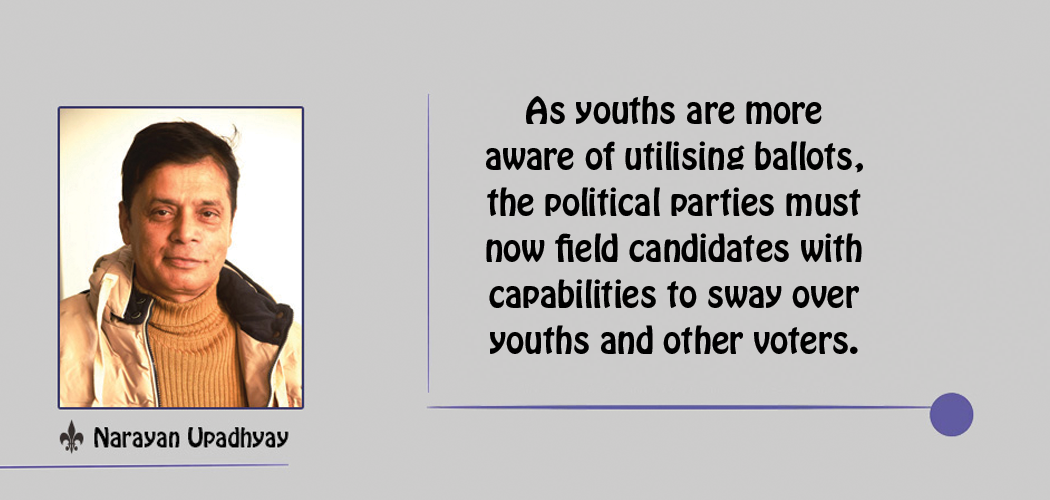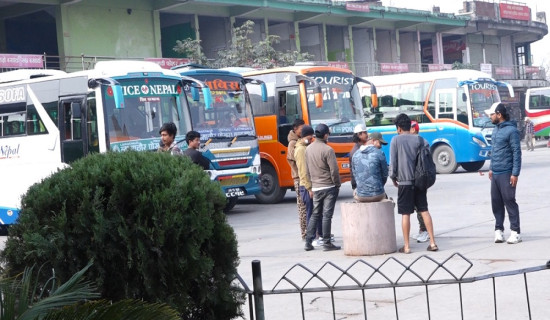- Tuesday, 3 March 2026
Local Poll Deflates Oli's Ego
Narayan Upadhyay
Voters displayed the power of ballots when they got opportunities to elect local representatives during the May-13 local elections held across the nation. As the result showed, the electorate voted for the ruling party alliance candidates and discarded the main opposition contestants at many local bodies thus puncturing the bloated ego of the UML chair KP Sharma Oli. With alliance partners improving their position as they won over a considerable number of local bodies, many construed the outcome as a powerful message to the UML that committed gaffes during its three-and-a-half years of rule under Oli.
Before the poll, the UML chair used to taunt the five-party government as a mandamus-induced government or a government made up through the mandamus order of the Supreme Court. Besides ridiculing the alliance, he used to brag that his party would claim a majority of local bodies because the people would not support the alliance. Nevertheless, voters proved Oli wrong as the alliance partners, especially the Nepali Congress (NC) and CPN-Maoist Centre, turned out to be the main gainers. Through ballots, the electorate gave expression to their pent-up frustration against UML and its leaders.
Alliance’s gain
The gain of the alliance is a sign that voters did not digest the way Oli and his hangers-on dissolved the parliament and went ahead with splitting the then Nepal Communist Party. Even after the five-party alliance formed the current government, the UML continued disrupting parliament proceedings for about nine months, frustrating the people further. As the local poll results started trickling in, the woebegone UML made an unconditional decision not to disrupt the House proceedings.
The NC, the largest among the ruling alliance partners, has so far finished at the top of the result table winning around 325 mayoral and 300 deputy mayoral posts in 753 local units, while the main opposition will have to satisfy around 205 mayors and 231 deputy mayors' seats. In the last local election held in 2017, the Congress had won only 266 mayoral and 223 deputy mayoral positions, while the UML had grabbed 296 mayoral and 331 deputy mayoral positions.
Likewise, the Maoist Centre triumphed in 110 local bodies while it claimed 111 deputy mayoral positions in the 2017 poll but has improved its performance by winning around 122 mayors and 126 deputy mayors positions. The five-party alliance has run away with about 500 mayors and 485 deputy mayoral seats. Having won at major places in the last election, UML has almost been wiped out from metropolises while it has lost many of the sub-metropolitan cities, municipalities and rural municipalities.
As things have turned out, the alliance partners are jubilant over the poll outcome, which has encouraged them to maintain the alliance for many years to come so that nobody would be a loser. Despite some misgivings that the alliance did not help some of its partners in winning the expected number of seats, it now appears that the five parties will contest the coming elections for the federal and provincial parliaments by giving continuation to the alliance. NC president and Prime Minister Sher Bahadur Deuba and Maoist Centre chair Pushpa Kamal Dahal Prachanda have made commitments in private and public to keep the alliance intact.
Apart from being remembered for delivering a blow to the UML, this local poll will be remembered for some unexpected outcomes. Of all the local bodies, the Kathmandu Metropolises captured attention as it produced an unlikely poll scenario. A young rapper, who is an engineer, has led the results over key contests representing the UML and the Nepali Congress. The vote counting trend shows that Balen Shah, 31, would walk away with victory. Another young female candidate, a former Newa beauty pageant winner, has led others in the deputy mayoral race in Kathmandu.
Also worthwhile to note are youth and rebel candidates putting up remarkable performances. An independent candidate, Gopal Hamal, cashed in on his immense popularity in Dhangadi Sub-metropolis to defeat the rival contestant of the Nepali Congress, the party that snubbed him while giving party tickets. Another winner, Harka Sampang Rai, an independent candidate who went on electioneering on his own with no supporters, won in Dharan Sub-metropolis on his promises to address pressing local issues. Manoj Kumar Shah Sudi, who revolted against the NC and fought for the Janakpur mayoral seat as an independent candidate, will as well win.
Balen, Hamal, Sampang and Sudi are the candidates that remind us that no matter how strong political parties and their candidates are, the voters often go for electing individuals who can effectively show their vision, elucidate programmes and plans for developing municipalities or localities. If we look into the recent results, we find that voters this time around have sided with youth candidates. Contestants 41 to 50 years of age have dominated the results. Overall, reports suggest that 560 local units have found youths as mayors and deputy mayors.
Heightened awareness
Young voters have taken part in this poll, thanks to heightened awareness of their right to elect representatives. Social media platforms such as Twitter, Facebook, Instagram and others turned out to be a key force to drive Nepali youths towards polling stations in droves. Youths also acted as influencers, helping form opinions among family members and neighbours regarding candidates and parties contesting in their localities. The success of Balen and Sunita Dangol in Kathmandu and other youth candidates in other locals is an outcome of the youths' active support of them as influencers.
Given the latest trend among youth voters, the poll outcome has sent an unmistakable message to political parties: they must now field youths with passion, knowledge and vision for causing or realising positive changes in the localities. As youths are more aware of utilising ballots, the political parties must now field candidates with capabilities to sway over youths and other voters.
(Upadhyay is Managing Editor of this daily.)
















